#(looking at you nissa nissa/azor ahai prophecy theories that are about fridging main characters)
Text

Few things loom over A Song of Ice and Fire quite like the Others - the pale, cold gods beyond the Wall, which first introduce us to the magic of Martin's world. Better theorycrafters (and writers) than me have gone at length about the thematic strengths of the Others, and how they contrast the coming struggle against the winter foretold by the Starks since Book 1 with the petty politics, intrigue and bitterness of the Southron courts, which see it better fit to war against each other than unite against the looming threat to, as they "hated iron and fire and the touch of the sun, and every creature with hot blood in its veins", as said by Old Nan in AGOT Bran IV.

When we first meet the Others, in the very first chapter of the entire series, the very first thing we are told of is the cold and the dark - and, of course, the dead. Waymar, Gared and Will are already put to discomfort before the Others are even hinted at, though it is clear that the three rangers know of the tales of White Walkers. Gared and Will are veterans of the Night's Watch, but as soon as there are hints of the darkness and the cold, Will seems to judge Gared ready to kill Ser Waymar for denying them a fire - and while it is true that Gared had already lost both ears and a finger to frostbite, we are also told that it is warmer than usual in the Wall, enough that it is weeping, or melting.
Of course, as we all know, the wildlings the trio was sent to track have disappeared, seemingly turned to wights - and it is here that we first meet the Others, and find one of their rare and few descriptions, at a moment where they seem all too human, perhaps more than anywhere else in the series. The Others are often framed as, well, Other - we see little of them but as distant shadows, the cold gods spoken of by Craster, and Old Nan's tales (more on that later).


Afterwards, of course, Ser Waymar and the Other engage in a duel, and notably, its companions do not engage; instead, they watch the fight, and approach only to deliver a coup de grace - and in what I believe to be one of the most interesting moments of the prologue, they speak, and seem to mock Ser Waymar.
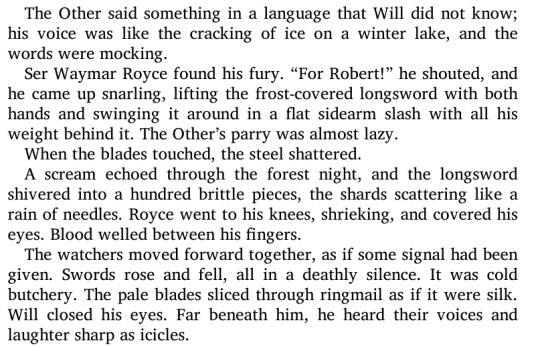
To me, this already provides a stark contrast to how the White Walkers were depicted in the show, which hints at an origin of them as men turned by the Children of the Forest as a weapon; though these warriors of frost seem cruel and dissimulated, they have a tongue, and communicate with each other, with distinct voices and both flair and personality. Interestingly enough, perhaps, the same conlanger who developed the Dothraki and High Valyrian tongues for the TV show supposedly began developing a tongue for the Others during the production of the show's pilot - though that idea was (unfortunately) dropped. The Others are a people, creatures of ice just as dragons are of fire, dwelling beyond where it is always winter - and they bear armor and swords of frost, speak a language of harsh ice and bring forward the cold wherever they come. Let us take a look at their other prominent appearance, in Sam the Slayer's great bout against the white shadow.


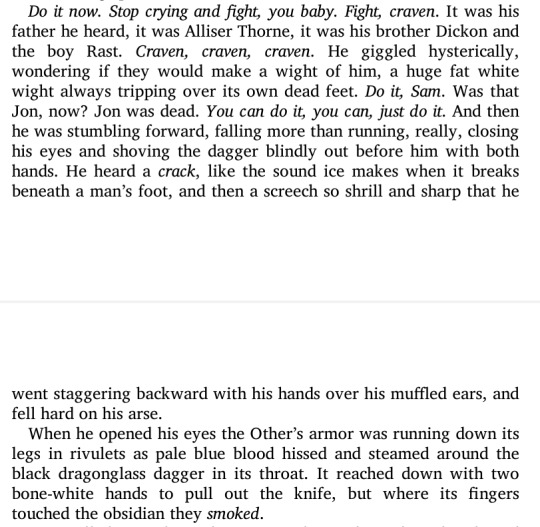

These are the two times we face the Others directly - and they are both heralded by the looming cold, the rustling of the trees, the darkness and despair filling the men who see them; they bear pale crystal swords, seem to melt at contact with obsidian, are able fighters, fast and elegant, and glow and shimmer in the reflective ice of their armor, turning the color of their surroundings as it reflects upon them - and interestingly enough, both appearances are near sentinel trees, though they are common enough in the North for it not be particularly aberrant.
Every single other thing we know of the Others, however, comes from other sources; some more reliable, such as Mance Rayder and Tormund Giantsbane, who have personal experience with them, while others come from distant reports, passed down in the library at Castle Black or by Old Nan's tales. We are told of the Long Night and myths of the North by Maester Yandel, and Craster speaks of his cold gods sparsely, but if anyone, he's the one who'd know them best; and Melisandre, the Red Witch that follows King Stannis, speaks of them as shadows, servants of the Great Other - a god whose name must not be spoken.
What is interesting, then, is what is not shown in both these encounters; we see no great ice spiders, no weaving of spellcraft, no eternal hatred for all that lives. They commit no particularly great atrocity for evil's own sake - they create their army of the dead through the wights, but it may well be motivated by the pragmatism of an unending army, rather than an ultimate desire or appreciation for undeath over life, as they show little appreciation or care for the walking dead but as tools of warfare - and the Others don't feed their servants the flesh of human children, nor do they deal with the Children of the Forest. Much of what we are told of the Others, and who they are, comes from secondary information, legends passed down generation after generation by wet nurses and servants to babes low and highborn alike.
I must take a moment here to emphasize that I don't believe that this disproves what we are told of the Others; while indeed the information that is shown to us is sparse, a lot of what is told is not a stretch at all, and it'd be unlikely for it to be entirely disproved - all the more when the source of information are Wildlings such as Mance, Tormund or Ygritte, who have been dealing with the encroaching advance of the Others for years now and lived with that threat more than any Southron Maester. However, I do think that there is more to the Others than an omnicidal horde of ice demons - fitting though the idea of a climate change allegory may be, I am skeptical that the ultimate conclusion to A Song of Ice and Fire lies in a reenactment of the Battle of the Black Gate. As Martin famously said to Rolling Stone,
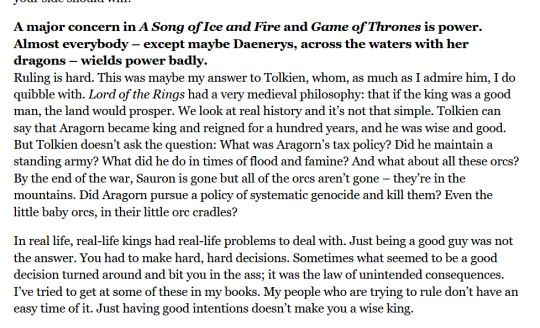
Of course, this line has been endlessly repeated, parodied and quibbled over, but I do think it's a recurring theme throughout the series - the full interview goes at length on a lot of fascinating points that I believe shed a very bright light on a lot of what Martin believes and how he writes, and you can find it here. Even the matter of the "little baby orcs" is brought up in the idea of the righteousness of Joffrey's assassination, and I definitely think it's a motif that bears keeping in mind; the innocence of children, and the conflict between their significance as the continuation of a line and the innocence they represent, is something that's touched on with the Lannisters, the conflict at Castle Black regarding baby Aemon Steelsong, and it is something that I believe will be reflected down the line whenever Craster's sons reappear.
The orcs in Lord of the Rings function, in many ways, a not dissimilar purpose to what the Others and their wights are; a looming threat casting a long shadow over the realms of men, over which the petty disputes of politics and family are secondary to what may yet be the end of life as we know it. An army so incredible and mighty that it seems hopeless for the sentinels of civilization to defeat, which will require that humanity either "face them and fight them or defeat them, or work with them, but […] do so as earthmen", to quote the fat man himself from that same interview. From the same interview, he comments this regarding the Wall and the Night's Watch:
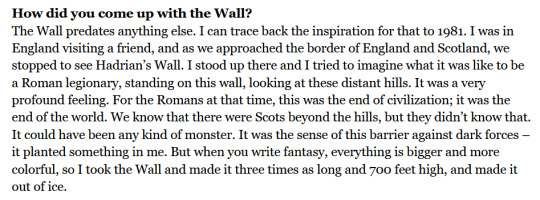
This is, of course, a personal piece of meta, reflecting on my own approach to the themes; but to me, one of the most consistent pieces of relevance in George R R Martin's writing is his capacity for humanity, and to empathize and humanize people and characters which would not, in the traditional fantasy genre with which he plays, be humanized at all - that's at the crux of PoVs like Jaime or Cersei, or Jon's journey with the Wildlings, or even a character like Sansa. The human heart in conflict with itself is the fundamental reason to write, to tell a story - and if there is no conflict with itself, if there is no humanity to be had, there is no story, or character.
Of course, there are missteps in the process; his heavily misogynistic treatment of characters such as the Dead Ladies Club, or the orientalist nature of the characterization of Dorne and Essos are some of the most litigious pieces of his writing in terms of abstracting humanity away from parts of the setting. But ultimately, when we do explore these areas and these characters, we meet people like Arianne, and we're made to care for even the commonfolk of Essos moreso than the commonfolk of Westeros, I'd argue, through the point of view of Daenerys and her own struggle for liberation, which is later expanded to a wider cause.
The Others are Otherised by their very name, by their very nature; they're not human, they're one of the most explicitly supernatural things in the setting, they open the very first book with a sense of dread. And yet, dragons such as Viserion can be granted sympathy and characterisation; GRRM is not unfamiliar with dealing with non-human characters in his other works. And yet, as he compares the Wall to Hadrian's Wall, don't we know that what lies beyond - in the Lands of Always Winter, in Scotland - are people? People who wage warfare and who laugh and sing, and who love and are torn apart between duty and passion?
To me, there's an intense disconnect between a profoundly humanist story, by an author who is notably critical of the usage of orcs and similar threats in fantasy literature, and the idea of an all-encompassing, apocalyptic and manichean conflict in the Battle for the Dawn; it's a deeply myopic worldview, and it is, indeed... Well, Melisandre who calls for it!
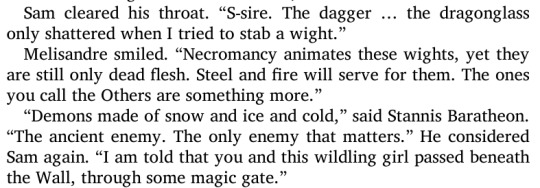
For what it's worth, I do not think that Stannis and Melisandre are characters to be taken entirely at face value - particularly when for a majority of ASoS, the word demon is used particularly to invoke *fire* - to invoke both wildfire, in the memories of the Blackwater, and to invoke R'hllor in Davos' perspective.
I'd continue on and talk a bit about my theories for the Others - the ideas of them as spirits, as creations of the Children of the Forest, as oathkeepers and Starks (I find the idea of them being oathkeepers is very interesting, and ties into some of Mance's story). Unfortunately, that'll have to be kept to another post, if I do write it, because I think the point of this one is very clear - to think of a Battle for the Dawn as the central point, to think of A Song of Ice and Fire as a story that serves to fundamentally legitimise the violence and warring against an enemy that is Otherised, seems to me to be missing the point. I sincerely hope that if The Winds of Winter comes out, we'll have a fresh insight into who, exactly, they are, but I've no doubt it'll be a more interesting explanation than "people you can murder without feeling guilt over it".
#asoiaf#valyrianscrolls#the others#meta#.txt#I'd also talk a bit about how like.#lots of people further use the idea of the others to make a big marvel hero team up#or even to justify specific situations#(looking at you nissa nissa/azor ahai prophecy theories that are about fridging main characters)#but i think the point is made#if the others are just ice demons you can struggle against and kill without worrying for their humanity (or yours)#then there's not really a human heart in conflict with itself innit#they need to be more than that if there's gonna be a story to be told#otherwise we could've just said “and then the bad guys invaded because we were too concerned with petty things like politics and violence”#not to mention that coldhands....... exists
35 notes
·
View notes